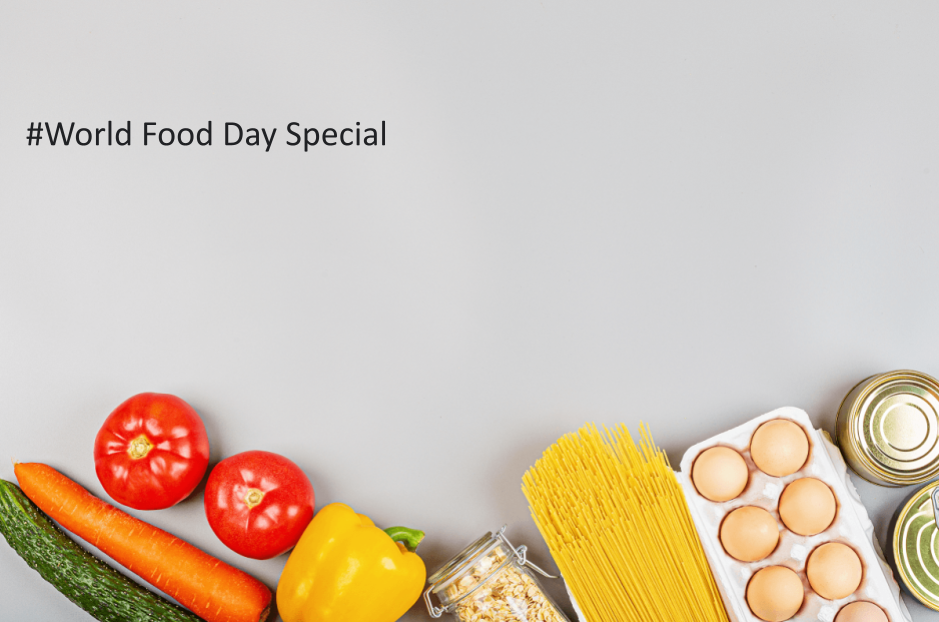#World Food Day Special
Ph.D. Nutrition Sciences
Better production, better nutrition, a better environment, and a better life – the theme for this year’s World Food Day on October 16. Collective action across 150 countries worldwide is what makes World Food Day one of the most celebrated days of the UN calendar. With a growing population, there is a demand for more healthy, nutritious not to mention sustainable and innovative food, and this year, it is time to investigate the future we need to build together.
Nutrition is the Focus
Good nutrition is the foundation for health and well-being, physical development, mental status, and economic productivity. It is the key to breaking intergenerational cycles of hunger and poverty because good maternal nutrition produces healthier children, who grow into healthier adults, who can work and earn and support the dependants. Good nutrition reduces disease and raises labour productivity and incomes, including people working in agriculture. Therefore, the nutritional status is a critical indicator of overall social and economic development.
Malnutrition in all its forms: undernutrition, micronutrient deficiencies, and overweight and obesity impose high economic and social costs on countries at all income levels. While the nature and causes of malnutrition can be complex, a nutritionally compromised diet is the common denominator among all types of malnutrition. The potential of food systems to contribute to the eradication of malnutrition goes beyond the fundamental role of agriculture in producing food and generating income, it is about sustainable production leading to sustainable diets.
Food Systems to Support Good Nutrition
Nutrition status depends on many factors, but food systems are an important part of the equation. As the population continues to grow, much more effort towards sustainable food production and supply chains needs to be given to ensure that all have access to nutritiously appropriate foods. Linking food production to food consumption is critically important to ensure proper nutrition. There are many cross-cutting issues with food systems and addressing a few of these will help for better production:
- Womens social status, empowerment, and nutritional status. Equitable opportunities to learn, earn and make the right decisions in households. These should be compatible with a healthy pregnancy and feeding practices.
- Climate-friendly food production. Local produce to help local farming, local produce that can be maximized per acre with infrastructure and resources. Diversified food production to avoid seasonal inflations. Food diversity and dietary diversity to avoid hidden hunger and micronutrient deficiencies.
- Expand markets and market access, particularly for marketing nutritious local foods or products with competitive pricing and farmer associations.
Better Environment
One of the key influencers to good food systems is the management of natural resources – healthy soil, safe water, biodiversity, and climate-friendly food production promotes a better environment. Management water resources to reduce vector-borne illness and to ensure sustainable, safe household water sources.
A Better You in the Future
Life is what makes you. You live, you love, you nurture, and you nourish life. A healthy you make a healthy life in the future. A malnourished child is weak, tired, misses school, drops out, is un-educated, and therefore grows to be a youth/young adult who cannot be employed. Unemployment impacts purchasing power and causes poverty. Poverty causes undernutrition and poor health. And with this, the vicious cycle repeats. Breaking this cycle requires investment in you. You are the center of this life and therefore the future. Good food means good nutrition and good health. A healthy you can grow and sustain life, be disease-free and vibrant, can work and earn and spread knowledge about good food and health.
Investing in Your Nutrition Knowledge
Nutrition knowledge can enhance the impact of food production and income in households, especially important for women and young children, and can increase demand for nutritious foods in the general population. Spreading awareness about healthy eating and diet diversity requires knowledge and skill up-gradation. Nutrition promotion and education are needed around food and sustainable production systems that build above the local and cultural knowledge.
Masters degree in Public Health (MPH) in Nutrition and Dietetics program at James Lind Institute (JLI) provides a basic understanding of core concepts of public nutrition and health. This Nutrition and Dietetics program is designed to impart knowledge on challenges that exist in the field of nutrition and health. The intense program provides a hands-on approach and skill-based learning, exposure to medical aspects of nutrition, food preservation, and microbiology, the effect of good nutrition and food safety in a community. Unique MPH in Nutrition and Dietetics via Master of Science in Public Health Management Program can be a great opportunity for aspirants. Opportunities are made available to conduct projects and promote research activities in collaboration with nutrition and public health organizations. This program ensures an advanced understanding of nutrition with project mentorship under Nutrition and Dietetics experts.
Masters program in Nutrition and Dietetics at JLI utilizes techniques and methodologies for a better understanding of diet and nutrition-related aspects of public health. This program with a focus on community and population health has been developed to create professionals that assume crucial roles within a broader public health setting. The responsibility of these individuals lies within community healthcare organizations, public healthcare, and tertiary healthcare set-ups, food industry, media and communication, academia and research, governmental and non-governmental organizations. The broad and deep knowledge disseminated helps to combat challenges related to nutrition and diet; support medical nutrition as part of treatment regimens for lifestyle-related ailments and diseases to patients; impart communication skills in advising patients, the public, and policymakers.
Our MPH program in Nutrition and Dietetics not only gives you the much-needed knowledge about food security but also empowers you to make a difference in policymaking for a better and sustainable future. Get in touch with us at James Lind Institute to know more.



